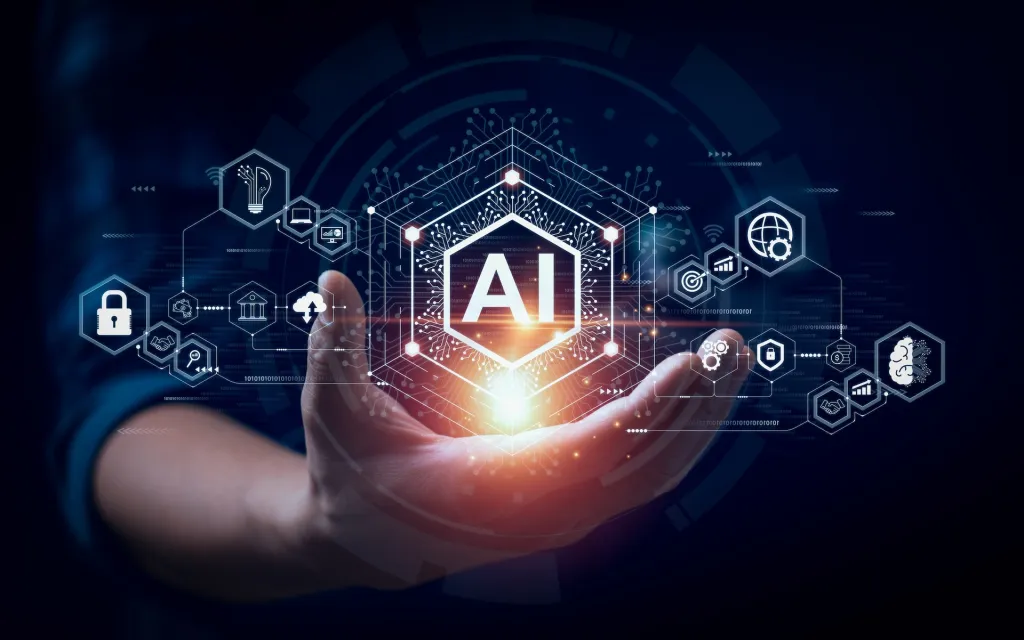
The Scope of AI: Present and Future Possibilities
Artificial Intelligence (AI) has evolved from a futuristic concept into a powerful force driving innovation and efficiency in everyday life. The scope of AI now spans across diverse sectors—transforming the way we work, communicate, shop, travel, and solve problems. Its influence is evident in everything from automated customer service and personalized recommendations to advanced medical diagnostics and autonomous vehicles. As technology continues to advance, the scope of AI is expanding rapidly, opening up new possibilities for businesses, governments, and individuals alike. In this blog post, we’ll delve into AI’s current capabilities, its future potential, the industries it’s reshaping, and the opportunities and challenges it brings with it.
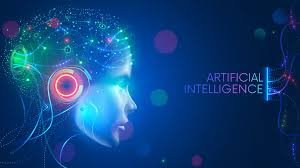
What Is Artificial Intelligence?
At its core, artificial intelligence (AI) refers to the ability of machines to execute functions traditionally associated with human cognition.This includes learning from data (machine learning), understanding and generating language (natural language processing), recognizing images and speech, making decisions, and even simulating human creativity. The scope of AI is vast, encompassing everything from simple task automation to complex problem-solving systems. AI can be categorized into three main types: Narrow AI, which is designed for specific tasks like Siri or Google Translate; General AI, a theoretical form that could perform any intellectual task a human can; and Superintelligent AI, a speculative level that surpasses human intelligence and remains largely a subject of philosophical debate.
Present Scope of AI: Where Are We Now?
The scope of AI today is vast and rapidly evolving, impacting nearly every major industry. In healthcare, it aids in disease diagnosis and personalized treatment. Finance relies on AI for fraud detection and automated investing. Retail and e-commerce use AI for recommendations, marketing, and customer service. Transportation benefits from self-driving technology and route optimization, while education leverages AI for personalized learning. AI plays a key role in real-time threat detection and prevention within cybersecurity.These examples highlight the growing and transformative scope of AI in our daily lives.
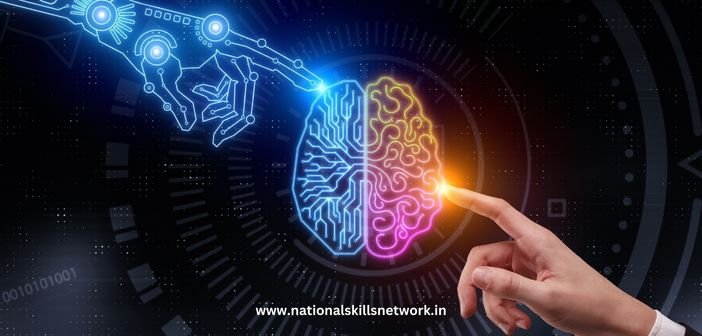
Future Scope of AI: What’s on the Horizon?
AI is still evolving, and the next few decades promise even more transformative changes.Some of the promising advancements on the horizon include:
1. General AI
While we currently have Narrow AI, researchers are working towards Artificial General Intelligence (AGI)—systems that can learn and apply knowledge across a wide range of tasks like a human being.
2. Autonomous Everything
AI will drive autonomy beyond just cars:
Drones for delivery and surveillance
Robots for elderly care, manufacturing, and cleaning
AI pilots in aviation and shipping
3. AI in Creativity
AI-generated art, music, and literature are gaining recognition.
AI tools like DALL·E and ChatGPT are helping creators brainstorm and produce original work.
In the future, we might see AI collaborating with humans on large-scale creative projects.
4. Smart Cities
AI will power urban planning and infrastructure:
Intelligent traffic systems
AI-managed utilities (electricity, water)
Smart surveillance for law enforcement and emergency response
5. Personalized Everything
From healthcare to education to shopping, AI will make nearly every service customizable in real-time based on user behavior, preferences, and context.
6. Quantum AI
Integrating AI with quantum computing has the potential to drive breakthroughs in:
Drug discovery
Climate modeling
Cryptography
AI Across Industries: Sector-Wise Potential
1. Manufacturing
AI-powered robots and predictive maintenance systems are boosting efficiency and cutting costs, while smart factories utilize AI to optimize production processes and minimize downtime.
2. Agriculture
AI is applied in crop monitoring, predicting yields, and operating autonomous machinery. Drones and sensors, coupled with AI, help farmers make data-driven decisions.
3. Legal Sector
AI automates document review, legal research, and even contract drafting. This significantly reduces the time and cost associated with legal proceedings.
4. Entertainment
Streaming services, video games, and even movies now use AI for content creation, personalization, and immersive experiences like virtual reality.
5. Human Resources
AI helps in recruitment by scanning resumes, matching job profiles, and even assessing candidates through video interviews using emotion and voice analysis.
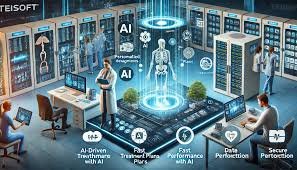
Opportunities Presented by AI:
1. Increased Efficiency
AI can handle repetitive tasks, freeing up human workers for strategic roles. This enhances productivity and reduces operational costs.
2. Data-Driven Decisions
AI makes sense of large datasets, providing insights that humans may overlook. Businesses can make faster, more accurate decisions.
3. Scalability
AI systems can rapidly scale operations without a corresponding rise in costs.This is especially useful in areas like customer support and logistics.
4. Global Accessibility
AI-powered tools can break language barriers and bring services like healthcare and education to underserved communities worldwide.
Challenges and Ethical Concerns
While AI holds immense promise, it also raises significant challenges:
1. Job Displacement
Automation may replace many jobs, especially those involving routine or manual tasks. Preparing the workforce through reskilling will be crucial.
2. Bias and Fairness
AI systems may inherit biases present in their training data, which can result in unfair or discriminatory outcomes.
Continuous monitoring and transparent algorithms are necessary.
3. Privacy
AI’s need for data collection raises concerns about user privacy. Regulations like GDPR are steps in the right direction, but more global frameworks may be needed.
4. Security Threats
AI can be used maliciously to automate cyberattacks, create deepfakes, or manipulate social media. Governments and technology companies need to work together to establish safeguards.
5. Accountability
Who is responsible when AI makes a mistake? Legal frameworks are still catching up to this question, especially in areas like autonomous driving or healthcare.
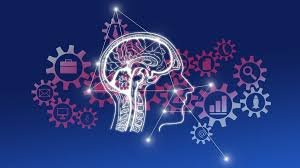
The Role of Human-AI Collaboration
Despite fears of AI replacing humans, the future is more likely to be defined by collaboration. AI excels at data processing and pattern recognition, while humans bring empathy, ethics, and creativity to the table.
Doctors and AI collaborating to deliver faster and more accurate diagnoses.
Writers and AI co-authoring stories and marketing content.
Designers and AI using generative tools to prototype ideas faster.
The goal should be to create systems where AI enhances human capabilities, rather than replacing them.
Education and Skill Development for the AI Era
To adapt to a world increasingly shaped by AI, educational systems must evolve:
Emphasize STEM subjects (science, technology, engineering, math)
Teach AI literacy from an early age
Promote soft skills like problem-solving, ethics, and communication
Encourage lifelong learning and digital adaptability
Governments, universities, and private companies all have a role in preparing the workforce for an AI-driven future.
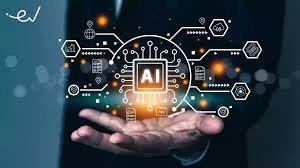
Conclusion: A Future Shaped by Intelligence—Natural and Artificial
The scope of AI is virtually limitless. It is already revolutionizing the way we live, work, and interact—and we’re just getting started. As AI continues to evolve, it will present new opportunities, industries, and ways of thinking that we can’t yet fully imagine.
However, with this immense potential comes responsibility. As we embrace the power of AI, we must ensure it is developed and deployed ethically, inclusively, and transparently. Done right, AI has the power to not just automate tasks—but to elevate humanity.
Whether you’re a business leader, student, educator, or just a curious reader, understanding the scope of AI is essential. The more we engage with this transformative technology today, the better we can shape its impact on our world tomorrow.